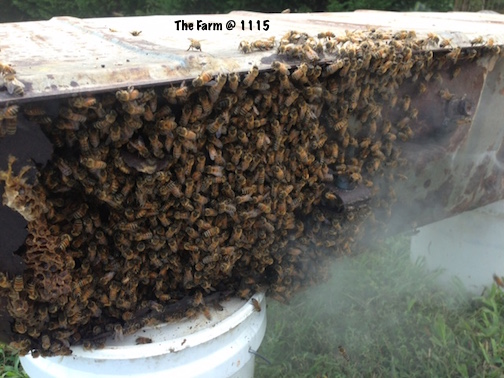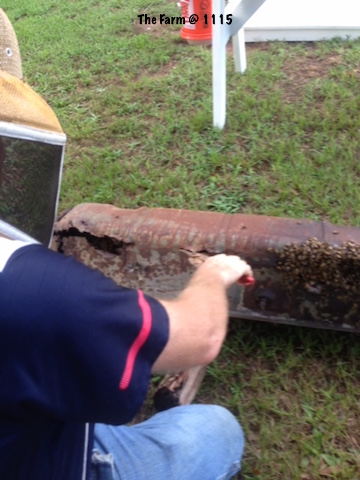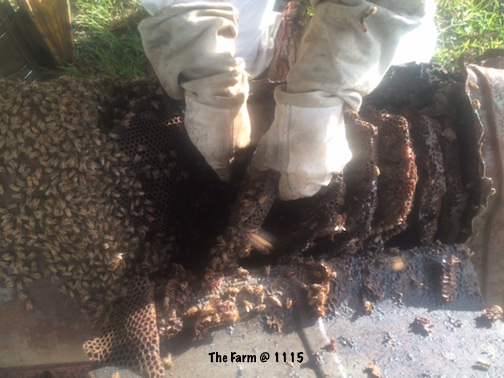My husband and I recently had the experience of trying to save some wild honey bees. I say wild honey bees because they didn’t come from a beekeeper or a regular beehive. They were in a gas tank.
What do you do when your buddy from over in the next county calls and says he has some wild honey bees in a strange location and can you help him? If you are like me, you agree to help and only later consider the consequences.
Over the weekend a fellow showed up on our doorstep and said, ”This guy gave me a gas tank with some honey bees in it. We tried getting rid of the bees so we could get the honey but they tore me up! Think you can help?”
After a brief discussion it was agreed we would try to help him out. I figured this was a great opportunity to start a top bar hive. Besides, if we didn’t take the bees those boys were going to end up killing them somehow or other. They were clueless as to what they were doing. (I eventually decided we were clueless too.)
They brought an old vehicle gas tank to the house. It was rusted in a couple of areas and the bees were right there at the entrances. We looked it over and decided try to capture the bees.
We used metal cutters to cut open the gas tank. The inside had about two inches of grunge and rust which had been knocked loose in the loading and transporting of the “hive”. The tank was in three compartments. The first compartment had very old comb, hive beetles and ants. The second compartment had dark comb with dark honey in it. The third compartment was where the brood comb was and most of the bee activity. A good bit of the brood comb had gotten mashed. There were also a LOT of hive beetles. There wasn’t any honey.
We cut out some of the good brood comb and tied it to some of the top bars. We were operating on the premise that if we found the queen, she and her girls would settle into the new home easier with some of their brood in there.
We found the queen and she was in a tizzy. She was on a piece of comb so I put it and her over in the hive. She wouldn’t stay. She kept trying to escape. I put her back in the bottom at least five times. We finally put the top on and tried smoking the bees up into the hive. We finally propped the gas tank up at the entrance and gave the bees a couple of bars to walk up into the hive. We figured since the queen was in there they would go to her and stay. Wrong!
The next morning, in the dark, I went to check the hive and tank. The hive was empty. They had went back to the tank. We put them all back in the hive and moved it to a different part of the property. We moved the tank in the other direction in order to avoid starting any robbing situations during the day. (HA! The joke was on us!)
That evening when I got home from work, hubby says,”You are going to be disappointed!” The bees had went back to the tank. The tank was involved in a full scale robbery and we ended up loosing the colony.
Now some thoughts on the situation.
- REVIEW WHAT YOU THINK YOU KNOW BEFORE YOU GET STARTED! We did not think the situation all the way through before accepting the tank.
- We did not consider the possibility of introducing disease from wild honey bees into our apiary.
- We introduced more hive beetles into the apiary.
- We failed to remove all trace of comb from the tank and I believe this caused them to go back I believe this ultimately caused the robbing and death of this colony.
- As late as it is in the season, I doubt this colony would have been built up strong enough for the winter which would have meant we would have had to feed them all winter.
- The guy wanted the honey from this tank. IS HE CRAZY?? There was no way I would have let him have any honey from a rusted old gas tank!
I know I made more mistakes than this. What are your thoughts or experiences?
















8 Comments
Hate that you lost the colony…but you did give it a good try!
Maybe vacuum the bees to use as a package. With old queen or new destroy old brood cone and gas tank use fresh frames with lots of good wax
We had an employee that was vacuuming out a very old gas tank… As the United-noticed fumes went up through the vacuum past the electric motor armature, it was ignited by the sparking and blew up the vacuum container sending him to the hospital with burns…
I need to move bees from my window sill. For a new window to be installed 10/12/15
How do I do it? I don’t even know what kind of bee it is!
All you can do is see what you have. Make the best effort, and hope it works. Sometimes the bees don’t get the memo, that you are trying to help.
Sorry to hear they didn’t survive.
I would have caged the queen and destroyed all the old comb and through away the gas tank far away. Or if you put them in a longstroth hive to could have put a queen excluded on the bottom keeping the queen trapped inside.
We did a bee removal in our first few months as beekeepers too and made mistakes as well. It happens. You were trying to help out, both your neighbor and the bees. When you see the queen, cage her. Put her in the new hive. You had the right idea by putting the brood in the new hive box, and by putting both the brood and the queen in there, most of the time the rest of the bees will follow. I would also not want any honey or old comb from the gas tank, but that’s me. Shaking or brushing the bees off the comb into the new hive would also be helpful, you want to have as many bees follow into the new hive as you can. They usually won’t go back if they smell the queen is there. They also can’t abscond if the queen can’t leave – so caging the queen is a really good move in most cases.
As for them not returning to the gas tank, perhaps covering it with an old sheet so that is it not accessible for at least 24 hours would be good. The bees still in there would not be harmed, but would have enough time to figure out that they were queenless. After that time, remove the sheet so that those bees can now rejoin their queen in the new hive, and I believe that they will. Remove and destroy (or harvest – your choice) whatever old comb, honey, etc, is left in that tank. Spraying the tank with “Bee Gone” can also help. I would not use a vacuum in this case because you have full access to all the comb in the hive by cutting open the tank, so I don’t think it would be needed. These are good ways to learn, IMO. You are asking the right questions!
And, don’t be too discouraged. My spouse and I have often been asked to try to help out friends who have a bee infestation (as opposed to managed hives) and we do help whenever we can. We don’t charge, mainly because we have no license or insurance and where we live we would need both of those in order to charge for bee removal services. We do it for the experience, and for the bees. Sometimes we are able to remove and keep the bees in a new hive, sometimes we end up having to destroy the bees due to it being impossible to remove them and also due to the “hotness” of the hive. Where we live, feral bees and many of our managed bees, are “Africanized” to some degree.
However, we don’t worry about bringing diseases back to our bees, our bees are not treated at all. They live or die by their own good genetically inspired habits, and if they were out in the wild they would be exposed. What we DO worry about is pesticides and chemicals that hurt them, do more harm than good, and only create stronger diseases and stronger chemically-ressistent pests. There is very good information on raising bees without any treatments on websites by Dee Lusby, Solomon Parker, and Michael Bush, just to name a few. Doing some research and letting go of the idea that bees can’t survive without chemicals, will put a lot more money back into your pocket, make your honey worth more at the local farmer’s market, and have you raising better and stronger bees. If your bees swarm out into the wild, are they able to survive without you and your treatments? If not, are you really helping the bee population? If you are into beekeeping for the sake of the bees and the planet, these are questions you may want to ponder.
happy beeking!
Wild bees in north america aren’t a native natural thing.
Honeybees aren’t native to the U.S. and so “saving the wild bees” by trying to keep feral bees is actually a lot more harmful to native populations of pollinators than just letting nature do her thing. More human interference isn’t helping much. I’m sorry, I dont mean to be a naysayer, but I have to put the facts out there.